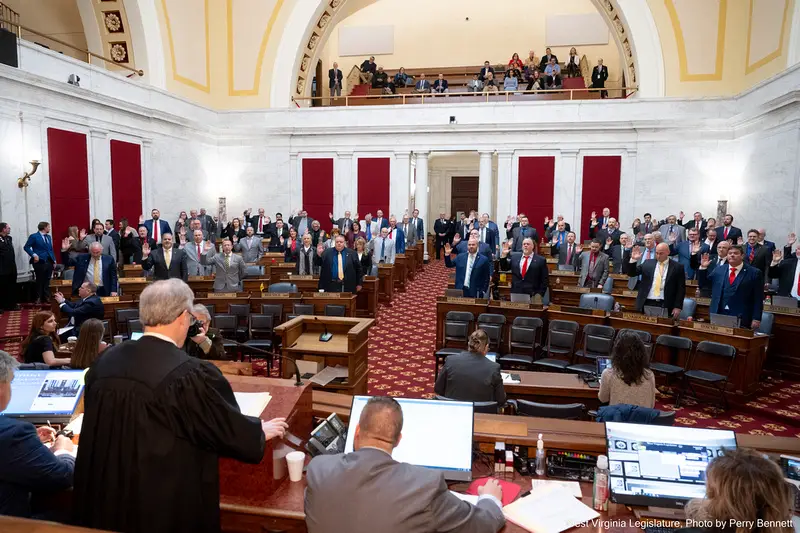CHARLESTON, W.Va. — Members of the House of Delegates voted last week to pass several education-related bills to the Senate for debate as the legislative deadline for bills to pass from one Chamber to the other approaches.
House Bill 2802, which passed the House by a vote of 98-0 Tuesday, was inspired by a successful local partnership between law enforcement and schools. It would allow law enforcement officers to substitute as many as eight of their required 16 hours of annual in-service training for hours served on-site in a school safety program.
“The thought is that officers would spend time in schools within their jurisdiction or immediately surrounding their jurisdiction, knowing that in the event of a school shooting every officer from anywhere close to that area is going to be responding to the school,” said HB2802 Lead Sponsor Delegate Jonathan Pinson, R-Mason. “If officers have had the opportunity to take eight of their 16 hours of in-service training inside a local school somewhere, they know where the cafeteria is, so if they get a call that a school shooter is in the cafeteria, that institutional knowledge will already be present; they’re not trying to figure out where the classrooms are, they’re not trying to figure out where certain facilities are.”
Pinson said he began working nearly four months ago with the state’s Law Enforcement Professional Standards (LEPS) Subcommittee of the Governor’s Committee on Crime, Delinquency and Corrections, which is responsible for law enforcement officers’ training and certification. The program is being modeled after the Shield Program in Jackson County, which is in Pinson’s district.
“Ultimately, they agreed this is an excellent idea,” he said, noting the bill was needed to allow the LEPS Subcommittee to set the parameters of a program and the subcommittee had already voted to create this one-to-one exchange for training hours. “I believe the LEPS Committee will go into further detail as to what they expect of these officers when they report to the schools for eight hours rather than reporting to in-service for eight hours.
“The thought being that those officers are out of their vehicle, they’re in the school, they’re around the school, they’re checking doors, they’re talking with students.”
Pinson said the Shield Program has allowed officers to develop relationships with teachers and students, which has led to several crimes against children being stopped or solved.
“It has also increased the unpredictability,” he said. “If someone wants to do harm to a school, they don’t know if that’s a day there may be an officer or two officers fulfilling their one-to-one exchange time.”
House Bill 2164, which would allow public and private schools to employ school safety officers, passed the House by a unanimous vote last week. The bill requires the state Division of Protective Services to establish standards for school safety officers, allowing them to carry firearms, requiring background checks and information sharing with the Division of Protective Services as well as annual training. House Bill 3166, which would allow each county board of education to establish standardized school safety mapping data and require the data be shared with relevant state and local agencies, also passed the House without a single vote against it this week.
House Bill 3024, unofficially called the guaranteed course transfer bill, passed the House unanimously. It would establish a framework to ensure students have a seamless road among high schools, career and technical education centers, community and technical colleges as well as baccalaureate institutions for post-secondary credits to guarantee transfer in a uniform way.
A bill to prohibit most cellphone use in schools passed the full House by a near-unanimous vote. House Bill 2003 would require the West Virginia Board of Education to establish rules for implementing the ban while allowing accommodations for students with disabilities, medical needs or Individualized Education Programs (IEP).
“I do believe there are a lot of distractions in the classroom, not only cell phones but also behavior. That’s why we had bills on discipline and behavior that came up,” said House Education Committee Chairman Delegate Joe Ellington, R-Mercer. “As far as devices, there are opportunities for devices to be used during the instructional day. We do have exceptions built into that.”
The 60-day, regular legislative session ends at midnight April 12.

















